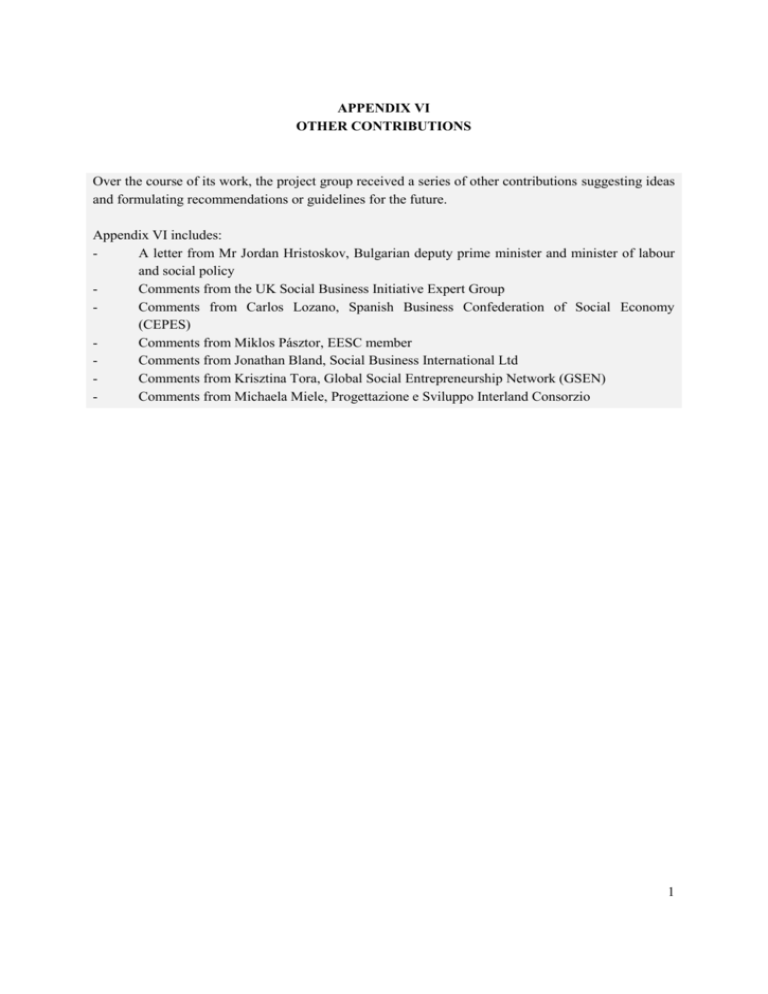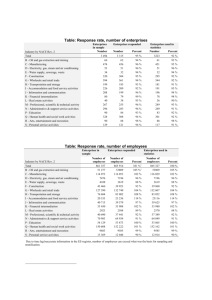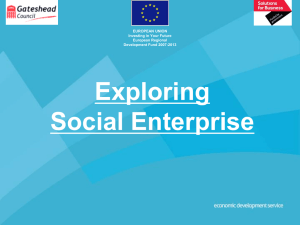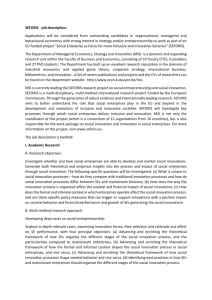2. Comments from the UK Social Business Initiative Expert Group
advertisement

APPENDIX VI OTHER CONTRIBUTIONS Over the course of its work, the project group received a series of other contributions suggesting ideas and formulating recommendations or guidelines for the future. Appendix VI includes: A letter from Mr Jordan Hristoskov, Bulgarian deputy prime minister and minister of labour and social policy Comments from the UK Social Business Initiative Expert Group Comments from Carlos Lozano, Spanish Business Confederation of Social Economy (CEPES) Comments from Miklos Pásztor, EESC member Comments from Jonathan Bland, Social Business International Ltd Comments from Krisztina Tora, Global Social Entrepreneurship Network (GSEN) Comments from Michaela Miele, Progettazione e Sviluppo Interland Consorzio 1 1. Letter of support of the Bulgarian Governement 2 2. Comments from the UK Social Business Initiative Expert Group (Bates Wells Braithwaite LLP, Big Lottery Fund, Big Society Capital, Cabinet Office, Charity Bank, City of London Corporation, National Council for Voluntary Organisations, Social Finance, UNLTD) 3 The EESC (European Economic and Social Committee) Social Enterprise project aims to give clear recommendations to the new European Commission and European Parliament for a second phase of the agenda to develop and grow the social enterprise sector. The EESC project has prioritised three particular principles (number 1, 3, and 5) in the Strasbourg Declaration to collect input and ideas. Principle 1: The EU must follow through on all the actions in the SBI. It should develop a second phase of the SBI that broadens its scope, deepens its partnership with Member States, regional and local authorities, civil society organisations and key players in the ecosystem. Principle 3: There must be a stronger engagement at EU, national, regional and local levels with the social enterprise community in the co-creation of new policies to support social enterprise, suited to the local context. Principle 5: In partnership with the social enterprise sector, Member States, regional and local authorities must fully support the growth of social enterprises and help them build capacity. For example through legal frameworks, access to finance, business start-up and development support, training and education and public procurement. In addition to the above, we suggest embracing some of the other principles of the Strasbourg Declaration: Principle 4: The Commission must ensure that its commitment to create an eco- system for social enterprise is mainstreamed in its policies. Principle 6: The European institutions and Member States should reinforce the role of social enterprises in structural reforms to exit the crisis, notably where the social economy is less developed. Principle 10: In this new Europe, all players need to look at growth and value creation from a wider perspective, by including social indicators and demonstrating positive social impact when reporting social and economic progress. Within the European Commission, it is important to make sure that there is a solid understanding and joined up approach to establishing a well-functioning social investment market. We would encourage, directly and through EESC, the EU to focus on the following activities to deliver systemic change for the good in relation to the Social Business initiative: Remove barriers to the growth of social enterprises and social investors (by, for example, revision to State Aid regulations); Enable growth of the social business sector (e.g. through targeted funding); Promote good practice which demonstrates the value of the social business sector and those engaging with it (e.g. achievements of those within the sector; procurement best practice around social value); 4 Advocate consistently that social business is not a minority interest, but something that can deliver deep and wide ranging benefits in both social and economic terms across the EU. Currently the sector is adversely affected by the status quo and there is a role for the EU to act to create a more even playing field; This potentially leads to relevant policy and practice being implemented by the EU. 3. Comments from the Spanish Business Confederation of Social Economy (CEPES) on the consultation with the European Economic and Social Committee regarding social enterprise - Carlos Lozano Presentation The Spanish Business Confederation of Social Economy (CEPES in the Spanish), which was formed in 1992, is a State-level business confederation whose cross-sector nature makes it the most important institution representing the Social Economy in Spain, setting itself up as a platform for institutional dialogue with public authorities. CEPES, as an organisation that brings together a range of existing economic initiatives under the concept of Social Economy, is made up of 28 organisations. All of these are State or Regional confederations and specific corporate groups, which represent the interests of Cooperatives, Labour Associations, Mutual Associations, Social Insertion enterprises, Special Employment Centres for disabled people, Fishermen’s Guilds and Associations from the Disability Sector, with more than 200 support structures at the level of the autonomous regions. CEPES exists as a sole spokesperson to integrate and unite all these confederate organisations; it defines itself as an economic and social agent which operates in the market and whose actions impact on society; one that has its own personality, defending a business model with its own specific values. It accounts for 12% of GDP, with a turnover of more than 150,000m Euros, and represents the interests of more than de 44,000 companies, more than 2,560,000 jobs, and more than 16,000,000 associated individuals. Within the CEPES business fabric we may identify social insertion enterprises, sheltered employment centres for disabled people, and social initiative cooperatives, which are the forms of the Social Economy enterprises that respond to criteria set out by the European Commission to identify so-called “social enterprises”, all of which makes CEPES a representative entity, through its members, of approaches to doing business identified as “social enterprises”. 5 Question responses - What, for you, is the social business model? The European Commission has already defined the social enterprise1 as an operator in the Social Economy, whose main objective is to have a social impact rather than to make a profit for its owners or shareholders. These enterprises, the European Commission ads, operate by providing goods and services for the market in an entrepreneurial and innovative manner, and use their profits primarily to achieve social objectives. They are managed in an open and responsible manner and, in particular, involve employees, consumers and stakeholders affected by their commercial activities. And it as such that, at CEPES, we define and understand Social Enterprises in accordance with the criteria established by the European Commission - In your view, what are the opportunities and challenges in the field of social enterprises? In the public institutional and policy development sphere, the following would be a priority in the opinion of CEPES: In accordance with the definition established by the European Commission, which we have just outlined, the European Institutions should, in coordination with the Member States, work to instil and use the same terminology which will enable the identification of social enterprises as part of the Social Economy, in such a way that the business reality at which the measures to be put into force are aimed is made even more specific, in order not to damage the overall ensemble of Social Economy Enterprises that are well established in the European Union. The diversity of terms (Social Economy, social enterprises, social entrepreneurship, or social business model) generates confusion, as sometimes they are used to define different realities, which would be correct, but in many cases are used synonymously, which is a mistake, because not all Social Economy enterprises are social enterprises as defined by the European Commission. The concept of the Social Economy enterprise includes not just so-called “social enterprises”, but also other business models such as cooperatives, mutual societies, associations and foundations undertaking economic activity. These enterprises and entities share a series of principles that were established by their representative organisations at European level in 20022. In fact, the Social Economy has benefited from considerable 1 2 COMMUNICATION FROM THE COMMISSION TO THE EUROPEAN PARLIAMENT, THE COUNCIL THE EUROPEAN ECONOMIC AND SOCIAL COMMITTEE AND THE REGIONS’ COMMITTEE Social Business Initiative l Creating a favourable climate for social enterprises, key stakeholders in the social economy and innovation /* COM/2011/0682 final */ Charter of the principles of the Social Economy: http://www.socialeconomy.eu.org/spip.php?article263 these principles are coherent with the principles identifying Spanish Social Economy enterprises according to law 5/2011 on the Social Economy. 6 recognition on the part of the European Institutions, which have drafted more than 250 documents in the past 12 years mentioning the Social Economy, and it is recognised to have made a significant contribution to economic and social development in the European Union. At CEPES we feel that the measures we need to put forward should necessarily take this scenario into consideration, in such a way that any EESC proposal ought to make it quite clear that, within the overall framework of the Social Economy, one may identify social enterprises, in order to strengthen the latter wherever necessary. - Has the Strasbourg event enabled you to enter into partnerships with other European stakeholders? As the representative organisation for the Social Economy and Social Enterprises in Spain, CEPES maintains collaborative links with all of the representative organisations from the Social Economy sector at European level, as well as those of various Member States, by being a member of SOCIAL ECONOMY EUROPE and COOPERATIVES EUROPE, these being organisations representing the Social Economy and cooperatives respectively. The partnerships already existed before the Strasbourg Conference, the conclusions of which have, for us at CEPES, gone to highlight the need to reinforce the development of the Social Economy in Europe even more, and not just that of social enterprises, which are a fundamental part of the Social Economy. In spite of both the associative and legislative progress we have seen in Spain regarding the Social Economy, the Strasbourg event has allowed us to initiate a debate in Spain on how to frame this new concept of the Social Enterprise (as it is defined by the European Commission) within Law 5/2011 on the Social Economy, with the purpose of analysing how this new business form may be made to fit in with the rest of the entities that make up the Spanish Social Economy. 4. Short Summery on Hungarian Social Entrepreneurship - Pásztor Miklós, EESC The Hungarian statistical system distinguishes two types of non-profit organizations: "classical" civil ones (foundation, association) and "non-profit enterprises". The latter form has existed since 2009, as a special form for social enterprises. The Hungarian law allows that a limited or public limited company can run as a "non-profit limited for public benefit". 7 This means that the object of this type of company must meet any state-responsibility issues. A special procedure exists proving the compliance. Such companies must reinvest their profit to their "activity by purposes of their statutory". Unfortunately, all such companies in Hungary were state-owned companies earlier, so there is not private- founded one. The cause of their transformation was the liberated employment policy and the greater freedom of management. They get subsidy from state-budget as same quantity as earlier. They can take charge for services and gather donates. 2500 companies exist in this form. The most ones operate in economic development and employment fields (41%), the next working field is education (16%), than culture (14%), social protection (9%), heath care (7%) and research-leisure-environment protection-police. Practically, this sphere of companies almost totally divides from “classical” non-profit sphere. They do not employ volunteers, but employ 80% of paid work of total employment of entire non-profit sector, and get 60% of state subside of sector, meanwhile the entire sector consist of 70.000 organizations. Nevertheless, the today Hungarian government does not use this form in the conversation of public services and utilities from private-owned company form to communal type; it uses the classical state-owned – centralized/bureaucratic/official – company form, especially in education, health care and utilities. Some words on "classical" civil/non-profit organizations: The majority of 65.000 civil organization is fundraiser by a state-owned or community-owner organization to supplement of other financial possibilities – for instance: a founding beside a school witch collect money from parents for field trip of student to spare personal income tax. 10% of them have not financial activity and the income of almost 50% of them is under €1500. The majority deal with sport, leisure, culture and interest protection (50%). The other main issues are education (14%), social protection (9%) and health care (4%). We can find social enterprises in the latest two fields, but majority is community-owned, not private. Source: Statisztikai Tükör, 2012/76, 2013/116, KSH (Statistical Mirror, Periodical of Central Statistical Office of Hungary, in Hungarian language) 8 5. Jonathan Bland, Managing Director of Social Business International Ltd, The meaning of social enterprise Social enterprise is about using a business model to achieve social (societal) objectives, harnesses the power of the market to benefit people and communities rather to simply maximise shareholder value. Social enterprises across Europe come in all shapes and sizes and use a very wide variety of legal forms and business models but the thread that unites them is the idea of trading for a social purpose. Opportunities There is growing interest in social enterprises from potential social entrepreneurs, governments (at national regional and local level) and other public bodies, some private businesses, educational establishments and financial institutions. Social enterprise could play a much bigger role helping tackle the challenges that face Europe around the ageing population, the environment and unemployment. Challenges The biggest challenge is awareness – a proper understanding of what social enterprise with a real danger of it being limited to very narrow legal forms in some countries. Access to finance and public service markets also represent significant barriers, along with articulating and measuring social value in practical and inexpensive ways. Strasbourg The event in Strasbourg brought together people interested in this field in a truly unique way. It established relationships with European partners for some of the UK E3M social enterprise leaders who took part. Personally, despite being locked away working on the declaration, I met some very interesting people who I have followed up with since, and as a result of being in Strasbourg have been invited to speak at a social innovation event in Belgium later this year. 6. Krisztina Tora, UnLtd, Global Social Entrepreneurship Network (GSEN) Sharing and mutual capacity building among organisations supporting early stage social entrepreneurs in Europe The EU Entrepreneurship 2020 Action Plan and the Social Business Initiative both value the contribution of social entrepreneurs to social and economic wellbeing in the EU. Social entrepreneurs contribute significantly to employment and sustainable economic growth, while also delivering social value and contributing to social inclusion and cohesion. 9 However, nurturing these many micro-scale social entrepreneurs requires flexible support at the early stage, to encourage large numbers of people to start up and move towards sustainability. Crucially, they require a combination of financial and non-financial support to do so. In Europe, for instance, in France, Spain, Belgium, Italy and the Netherlands, social entrepreneurship accounts for between 9% and 11.5% of the working population. There are specialist agencies supporting early stage social entrepreneurs in some Member States, and new agencies are being established in response to demand in others. But this support remains patchy and insufficient: we are collectively only helping a few thousands of social entrepreneurs in Europe. How can the EU do more to unleash entrepreneurial potential? We launched the Global Social Entrepreneurship Network (GSEN) a year ago during the G8 Summit in June 2013. It is today a growing network of 39 organisations supporting social entrepreneurs in over 27 countries; half of those organisations create impact in Europe. A first meeting of those European GSEN members prior to the Strasbourg event, and another one in April 2014, enabled discussions on common challenges. They have agreed on the value of mutually sharing approaches and tools, and are committed to building the capacity of emerging support agencies in other countries. They want to collaborate and become more efficient in providing higher quality support to social entrepreneurs. Their common aim is to develop improved initiatives to strengthen support for social entrepreneurs across Europe, but they are faced with several challenges: 1. The need for an equal focus on both social investment and social entrepreneurship support. Social investment funds are growing worldwide, with a $40 billion yearly market to invest in social entrepreneurs. The EU has created work streams to develop social investing in Europe but with no clear strategy to create a “pipeline for investees”. Indeed, there is a critical gap: there are simply not enough strong, investable social ventures in the pipeline, and social investment organisations have too high costs of capital to meet the needs of social entrepreneurs, especially those at early stages. The types of financial solutions available to early stage social entrepreneurs are rarely aligned with their actual needs. There are many gaps in the support value chain and the ecosystem to create the right conditions for “offer of impact finance to meet the need for it”. 2. The need to build capacity for social entrepreneur support organisations. Organisations supporting social entrepreneurs at early stages are themselves fragile. Across the world, as well as in Europe, support for start-up social enterprises is emerging and highly experimental: most support organisations are less than 5 years old. Based on our most recent survey, support organisations don’t want to spend resources on reinventing methodologies, but are eager to learn them from others. They want to learn from others the successful tools and methods of support. They are experimenting with new approaches of support but don’t have a platform to share their successes, failures or innovations. They battle to be sustainable and find adapted financial resources, but at the same time they lack skilled professionals and struggle to retain them. They also often need to build awareness around social 10 entrepreneurship, advocate to governments and contribute to build markets for the social entrepreneurs they support. In a nutshell, in many cases support to social entrepreneurs (when it exists) is not the most efficient possible since support organisations lack resources and support to create the expected outcomes and impact. What can be done to enhance and scale up early stage support to social entrepreneurs and how could the Commission support this? How can we encourage peer learning between social entrepreneur support agencies across the EU? For further work and concrete actions we recommend: - That the Commission recognises the need to shift: o From experimental emerging approaches to a robust professional support sector and commits to support that professionalization. o From a focus on “impact investment” to more focus on the need for nonfinancial support and capacity building, and commits to support that capacity building. - That the Commission not only commits to support capacity building but also provides the right resources and mechanisms to achieve the end goal of availability of quality financial and non-financial support to all social entrepreneurs who would need it. It will allow more consistent and larger scale social impact creation since social entrepreneurs will spend less time trying to access the resources they need and more time delivering projects. - That the European Commission’s work plan from 2014 onwards includes a work stream on enhancing early stage support to social entrepreneurs. - That the Commission recognises the value of peer learning between social entrepreneur support agencies across Member States, with a particular focus on building capacity in those Member States in which the support ecosystem is less wellestablished - That the Commission encourages this in the context of existing mechanisms such as GSEN (and perhaps create new ones if and where gaps are identified). On other specific items aimed at bringing forward policies and actions of the European Commission, we do agree with the recommendations of the UK working group coordinated by NCVO (Members of UK Social Business Initiative Expert Group). Therefore we will not repeat them here, but we reinforce all their points and recommendations. 7. Michela Miele, Progettazione e Sviluppo Interland Consorzio The economic and financial crisis has been producing a series of serious consequences on employment as well as highlight some problematic aspects regarding specific activities and contexts of the market economy, it has also revived at the centre of political and economic debate on the role of the market in the development of capitalist society and the limits of incorporation, even degeneration, that this system brings. 11 The crisis we are experiencing lies within a process of transformation of the post-modern western, which is crossed by a number of challenges: - globalization that breaks the link between production and the land; - the demographic problem of population aging; - the crisis of politics, work, family, - new needs and new forms of poverty; To address these challenges are no longer sufficient market responses (the production of wealth) and the State (the re-distribution of the wealth produced). It becomes necessary to retrieve the size of the gift and reciprocity in relationships between people, communities and organizations and here is where Social Enterprise, expression of Social and Civil Economy, becomes meaningful. The challenge of the civil economy infact is to facilitate the co-existence, within the same social system, of the three regulative principles of economics: 1) The exchange of equivalents (contract), which refers to the value of efficiency; 2) The re-distribution of wealth (welfare) that refers to the value of equity; 3) Reciprocity (fraternity) that refers to the value of the gift. Civil economy has an approach that looks and fits the experience of human sociality and reciprocity within a normal economic life, neither side, neither before nor after this. In Italy this theoretical framework has a centuries-old tradition in Italy and it has been reflected in the development of many experiences that combine aspects of efficiency, with the principles of equity and solidarity between people: the development of social cooperatives and the constitutional recognition of the cooperative movement itself (Art. 45 of the Constitution). We can say that in Italy Social cooperative is a valid example of Social Enterprise: a cooperative business model that is based on the principle of "internal mutuality" (the maximum possible benefit to its members), the principle of "external mutuality" (the ability of the company to focus its activities in favour of a benefit outside of "general interest" in fact, and also to represent the general interest in the enterprise governance. The main challenges for the Social Enterprises and the Social Economy are related to the political choices of the territory that should develop a genuinely plural market as a place of efficiency, equity and solidarity; promote and sustain organizational forms that perform economic activities oriented to co-exist with the principles of the exchange of equivalents, of re-distribution and reciprocity; build a regional welfare authentically based on the community activation On these lines some strategic guidelines and concrete actions can be identified and implemented: 12 Develop the monitoring system of procurement in order to promote the use of social clauses between contracting authorities Support the coordination of tools used for social inclusion and employment of people in condition of disadvantage Develop experimental interventions aimed at supporting social economy experiences, giving evidences to the specific opportunities offered by social cooperatives, meant as active actors within the local socio-economic development able to integrate policies and opportunities for social inclusion and working. 13






